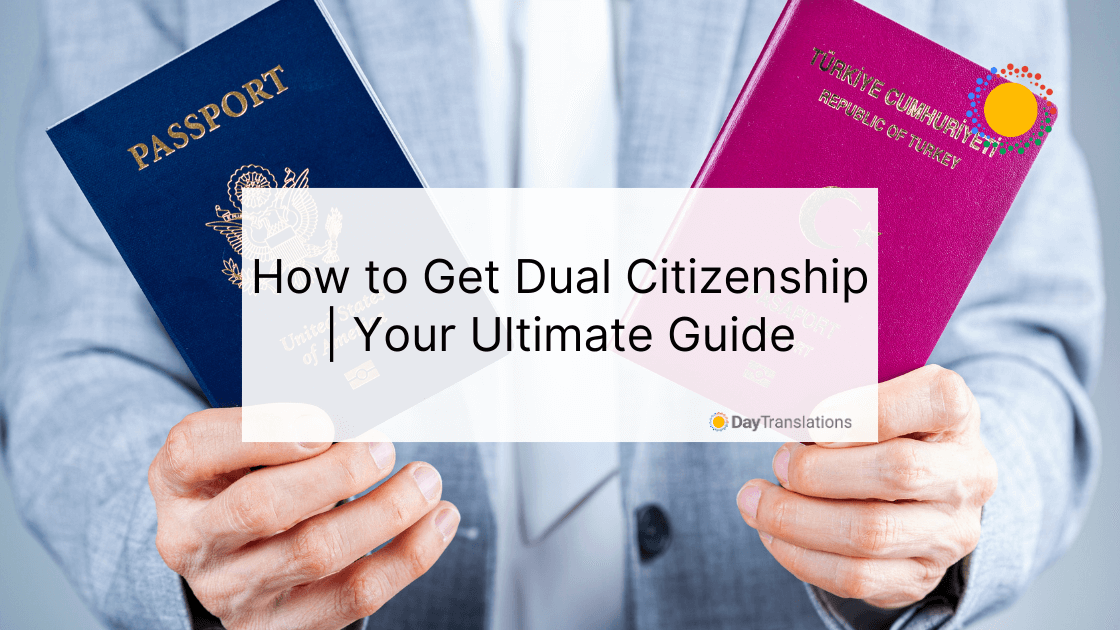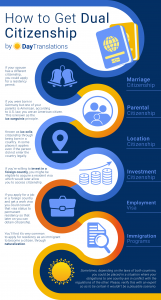The anarchist dream is over. We are all citizens of at least one state.
When digging into the regulations around citizenships, it is no surprise to find out that every country has a particular set of rules, with nationality laws and politics of its own.
This article includes an analysis of how to get dual citizenship, the requirements and considerations necessary, along with the benefits and also difficulties that you might face.
What do we mean by it?
Saying someone has dual citizenship means that that person is legally considered to be a citizen of two different states at the same time. Therefore, he or she will be obliged to follow the law of both countries and will also have legal rights recognized in each of them.
Now, not every country allows dual citizenship. So, before you make up your mind, we thought it would be useful for you to know the pros and con of getting a dual citizenship. The point is not to discourage you, but to be clear about every practical aspect involved, including those which are not very known:
Pros, folks
- You’ll receive the privileges offered by each country. Social service system, voting (even running for office), working without the need for a work visa and access to education at a citizen tuition rate.
- Forget about long-stay visas. No more questions regarding the purpose of your trip. You’d have the right to entry in both countries, which facilitates a lot of things, especially when it comes to studying or even doing business.
- It’s an opportunity to be immersed in two cultures at the same time. You could learn about the history of both countries, two languages. Not as a tourist, but as a resident who’s familiarised with two ways of life.
- Buy a house. If you want to, you could. And in two different places in the world. You’ll count on the ability to own property in either country. This tends to be remarked since land ownership is restricted in some countries to citizens only.
Remember the cons
- Sometimes, depending on the laws of both countries, you could be placed in a situation where your obligations to one country are in conflict with the regulations of the other. Please, verify this with an expert so as to ve certain it wouldn’t be a plausible scenario.
- Consular protection! I know it’s a rare need, but in most states, it’s a right. Make sure that the provision of consular protection wouldn’t be jeopardized when finding yourself in the country of your second nationality.
- Always carrying both passports. That’s right. Both of them. It’s safer to keep them both, especially when you travel.
- Double taxation. Yup. This one is a b…bad thing. Some countries, like the U.S., impose taxes on its citizens over the earned income anywhere in the world. So again, consult with a qualified expert, even tax accountants and a citizenship lawyer, because tax laws are actually complicated and the could change in a year from now.
- Be patient, since generally, citizenship-application processes tend to be intensive, expensive and very demanding. It could take time, even years, so be prepared for that.
How to get dual citizenship
Alright, so, if you still want to move on with this project, we’ve organized a series of steps that should be followed in order to acquire dual citizenship. Just so you know, the main procedure will be highly determined by the purpose of your citizenship. Is it for business? Are you getting married and starting your family in a different country? You were born in a country you never lived in and now you’re interested in moving there?
First, we’ll put together a list of the in-depth articles we’ve written for you to help you become a citizen from a specific nation. We’ll be updating these with more countries, so check it out below:
- How to Get a Japanese Citizenship
- How to Get German Citizenship
- How to Get Russian Citizenship
- How to Get Italian Citizenship
- How to Get Israeli Citizenship
Now, let’s take a look at these different ways to obtain dual citizenship:
Bells ringing – Dual Citizenship through marriage
- What’s your spouse’s citizenship? If you’re married to someone who has different citizenship from yours, based on your marriage you could apply for a residency permit as long as you meet that country’s residency requirements. Each country has its own application process for this matter so there’s no standardized amount of time that it would take. Although the requirements for residency tend to be similar, like age and language.
- Warning! No fake marriage trick. In many countries, this counts as fraud which is a criminal act with severe legal consequences.
- Check the law. Again, not every country recognizes dual citizenships and you might be obligated to renounce your previous citizenship.
––––––––––––––––––––––––––––––––––––––––––––––––––––––––––––––––––––––––––––––––––––
Ready to start a new life abroad? We can help you with the translation of your immigration documents, in any language.
––––––––––––––––––––––––––––––––––––––––––––––––––––––––––––––––––
From mama/ papa’s side- Dual Citizenship through parentage
- What is your parent’s citizenship? Ever heard of ius sanguinis? In some countries, citizenship is not up to the place you were born, but to the blood that runs through your veins. For example, if you were born in Germany but one of your parents is American, according to U.S. law, you are an American citizen, regardless of the place your birth took place. In this case, you would have dual citizenship.
- Do some research. Verify if the ius sanguinis principle is contemplated in the state your parents (or at least one of your parents) were born and find out if you would be obligated to renounce your birth-place citizenship.
- Acquiring citizenship through parentage implicates a process that varies according to the country. The Consulate is probably a good place to start digging and access reliable guidance for any questions you may have.
I was born in…- Dual Citizenship through birthplace
- Another term that might be useful is ius solis. The unrestricted and automatic right of soil, meaning, the right to be a citizen of that country by being born there. Figure out the immigration laws: some countries recognize the citizenship of babies born in their soil, even if they were children born to people who entered the state illegally (such as Canada, or the U.S.)
- How to exercise citizenship through right of soil? Apply for a passport through the consulate in your current state of residence, presenting your birth certificate as evidence (make sure it is presented with a certified translation).
- In this case, too, verify that enforcing your right of soil doesn’t require renouncing your current citizenship.
How much is it?- Dual Citizenship through investment
- If you’re willing to invest in a foreign country, some states consider you as an eligible individual to acquire a resident visa which, after a few years, would allow you to access citizenship. Now, this is not cheap at all. We’re talking about an investment range with a minimum of several hundred thousand dollars, even millions.
- How long does it take? After knowing the price, this has to be your second question. Some countries require you to remain as a resident for years before becoming a citizen.
- Also in this scenario, check if one of the requirements is renouncing to your prior citizenship.
I got a job in…- Employment visa
Another way to obtain second citizenship is to apply for a job in a foreign country. If you have a work visa you could convert that visa status to permanent residency so that later on you can obtain citizenship. Some countries have different categories of od employment visas with their specific requirements.
What about immigration programs?
You’ll find it’s very common to apply for residency as an immigrant to become a citizen. First, though, as we’ve seen so far, you need to be a resident so that then you can apply for citizenship through naturalization.
Say I wanna do it
If you’d like to receive deeper counseling on how to get dual citizenship and, in order to do so, you’re in need of immigration translation services, contact us so that we can help!
















Sorry, the comment form is closed at this time.